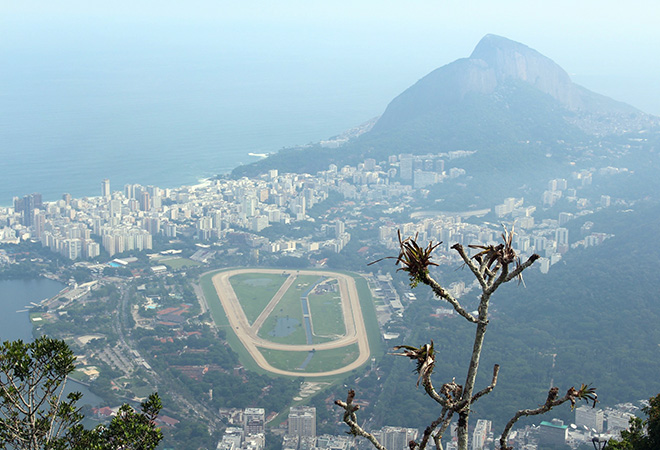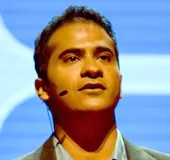
The flight into Rio De Janeiro creates an idyllic setting. The turquoise blue waters of the South Atlantic serenade tourists and locals alike that flock to the world-famous sandy beaches of Copacabana and Ipanema. Juxtapose the depths of the oceans’ wonders with the imposing heights of Rio’s hilly terrain. On top of one such hill, is Rio’s iconic Christ the Redeemer, which keeps a watchful eye over the city and the iconic Maracanã Stadium, which hosted the 2014 World Cup finals. In one such splitting image, two of the more defining aspects of Brazilian life, Catholicism and football (soccer for your American tongue) is captured.
Yet I was told by one such Brazilian academic that, Rio De Janeiro — the city of Brazilian dreams is pretty from a distance, but it gets ugly when you get closer. The city has long grappled with a high crime-rate, drugs and poverty that is endemic through the favelas (popularised by the cult film City of God).
Brazil, like the United States is one of the largest countries in the Western Hemisphere. But the similarities aren’t just restrictive to the geographic size; in fact the similarities get insidious. Brazil too has grappled with a problem with rising police brutalities. With the increasing crime rates, the lines get blurred between law enforcement and police brutality with reports of the Brazilian police force having killed the most in 2018 and suffered the most casualities in terms of death toll.
Although very multi-racial, Brazil has long postured a colourful canvas of a diversified utopia. However, visits to the Afro Brazilian museum will reveal that Brazil was the last country to formally abolish slavery. A history of indentured labourers and slavery with 4 million blacks that were shipped from Africa. A whopping 45% of those individuals brought to all Americas (including the USA) came through the shores of Rio.
Although very multi-racial, Brazil has long postured a colourful canvas of a diversified utopia.
A discussion with IPEAFRO, (a nonprofit based out of Rio that deals with the historical identity and cultural preservation of Afro-Brazilians), reveals that there still lingers a hierarchical society in Brazil with various citizens subtly being pegged into different classes — first, second and third class citizens. The disparities get evident when media reports show the woeful statistics of 73 Afro-Brazilians that die every day, translating to 3 people per hour. In 2017, Brazil defeated its own record with 64,000 homicides reported, beating its own record with a 3 percent increase from the year before. Increased reports of shoot and kill without apprehension of any drugs or weapons further accentuates the police brutalities.
Brazil has earned the infamous reputation of being the most violent country in Latin America and has the highest number of prisons after the United States. Gang wars are rife in Brazil, with Rio De Janeiro (Brazil’s Los Angeles) noted to have three gangs that control drug distribution while the commercial capital of Sao Paulo (Brazil’s New York City) is said to have a single gang that handles the contraband. There has been an outcry among human rights watchers to clamp down on police brutality. The clamor is that the traffickers are simply the poor pawns from the favelas, and little is done to clamp down on the kingpins and the drug lords. Back in 2013, there was nearly 450 kgs of cocaine seized from a helicopter belonging to a Brazilian senator. The death toll and violence in the favelas means its Afro-Brazilians who are twice as more likely to die as compared to their non-black counterparts.
Politically, Brazil is going through a seminal moment. The largest country in South America, which has traditionally voted in social democratic parties, flirted with the far-right movement in 2018. Brazil had one of the most expensive elections in the world, more than the world’s oldest democracy, the United States in 2016, but lesser than the largest democracy, India in its 2019 elections.
Politically, Brazil is going through a seminal moment. The largest country in South America, which has traditionally voted in social democratic parties, flirted with the far-right movement in 2018.
Enter Jair Bolsonaro, a former military man turned politician of the Social Liberal Party a far-right conservative party. He espouses several values of the conservative tea-party GOP movement in the US by declaring his opposition to same-sex marriage, homosexuality, abortion, affirmative action (reservations in India), and critics even point out his disdain for secularism. Dubbed as Brazil’s Donald Trump, the far-right candidate wooed the Brazilian working class (one poll stated that a majority of cab drivers across Rio De Janerio and Sao Paulo voted for the current president) stating that all the other parties were corrupt and his message was to eradicate crime and corruption but turning Brazil back to its ‘traditional way in terms of faith’. Brazilian academics note that the bill to curb corruption now gives the law enforcement more authority to use force. Apart from minorities, there has been increased violence against women and members of the LGBTQ community.
There is a fear that Bolsonaro aside; his cabinet is stocked with eccentric individuals with dangerous ideas. The former education minister who was recently sacked, came with his share of controversies. Ricardo Velez wanted to rewrite school textbooks to describe the 1964-85 post-coup military dictatorship as a “democratic regime of force.” He espoused wanting to make Brazil evangelical and insisted on the Bible being taught at school. Velez wanted to mandate compulsory singing of the national anthem across all schools and chant Bolsonaro’s campaign slogan.
Even before the Bolsonaro government, there was this worry that the Brazilian education system needs a massive upheaval. In a pan-portuguese nation, the English-speaking diaspora is relatively low compared to other non-English speaking countries. Brazil has a problem of a large portion of the students who learn the language but can’t converse in it easily. The ones who do have been offered the privilege of private education, another mark against the public education system. There is a fear that majority of the population may have inadvertently isolated themselves as a result of being not being able to converse in English and the Portuguese speaking countries outside Brazil, are just a handful (Portugal, Cape Verde, Mozambique and Angola). There is a huge population in the age gap of 15-35 years of the youth that are either out of the education force or out of the workforce.
Bolsonaro enjoyed the support of certain parliamentary members dubbed as the BBB caucus, which stands for bullets, bible and beef. In other words, a 326-member congressional caucus alliance known for its impassioned support of guns, agribusiness and all things towards Christianity. Brazil is going through a political and economic crisis. The country has come a long way since the ouster of military rule in 1985 and since then the country has adopted a new constitution.
 Aerial view of Rio De Janeiro.
Aerial view of Rio De Janeiro.
Globally, Brazil remains one of the most open in terms of international investment. It’s the eight largest economy globally, the largest in the Latin American region and second largest in the Americas, with natural resources in gold, uranium, iron and timber worth 22 trillion dollars. It is the world’s largest coffee producer. Under former president Lula Da Silva, Brazil enjoyed a healthy growth rate, so much so that it made the exclusive Goldman Sachs club of BRICS (Brazil, Russia, India, China, South Africa), an acronym for the fast-growing emerging market countries.
Globally, Brazil remains one of the most open in terms of international investment. It’s the eight largest economy globally, the largest in the Latin American region and second largest in the Americas, with natural resources in gold, uranium, iron and timber worth 22 trillion dollars. It is the world’s largest coffee producer.
The former President Lula, widely popular had a high approval rating of 85 percent, but according to some economists, he rode on reforms previously introduced and on the country’s commodity rich resources. There was little done to reform the pensions and tax structure. His plans to run again in 2018 came crashing down with his arrest on corruption charges, courtesy Operation Car Wash. This evinces one academic statement that the corruption in Brazil is not petty, but highly networked.
His successor, Dilma Rousseff, Brazil’s first female President, was not implicated in the same scandal but she didn’t survive impeachment. Brazil, like its neighbour Argentina, underwent an economic crisis with rising unemployment and dwindling economic growth. Rousseff’s approval ratings dropped into the single digits. The economist President was accused of fiscal irresponsibility and mismanagement of budgetary resources.
The FIESP, a trade association in Sao Paulo notes that while populism is not just restricted to the political right, it is almost unusual for Brazil to have right wing governments. The ennui with political corruption enabled a Bolsonaro government to take shape. The ‘Trump of the tropics’ as Bolsonaro is known has praised President Trump and wants to take a cue out of the President’s book by doling out key posts to family members. He is considering nominating his son as Brazil’s ambassador to the United States. The fear is unlike the United States, Brazil does not have the robust institutions, or a strong system of checks and balances needed to keep a far-right government from spreading its negative spheres of influence.
Brazil has been a country that has been the envy of the footballing world with five world cup titles. They coined the phrase Joga Bonito (beautiful game) emphasising to ‘play beautiful football’. But for all the beauty in the form of countless stars in Pele, Ronaldinho, Ronaldo and the exotic Samba flair, it’s the politics of Brazil that could be heading for an ugly turn.
Photos by the author.
The views expressed above belong to the author(s). ORF research and analyses now available on Telegram! Click here to access our curated content — blogs, longforms and interviews.




 Aerial view of Rio De Janeiro.
Aerial view of Rio De Janeiro. PREV
PREV


